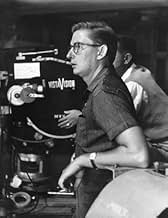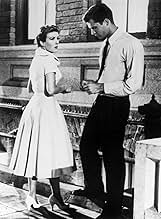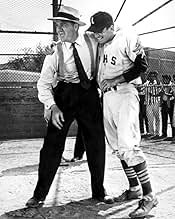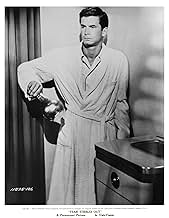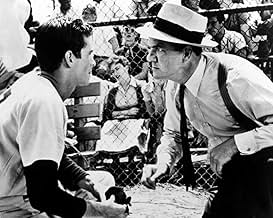IMDb-BEWERTUNG
6,9/10
2255
IHRE BEWERTUNG
Füge eine Handlung in deiner Sprache hinzuTrue story of the life of Jimmy Piersall, who battled mental illness to achieve stardom in major league baseball.True story of the life of Jimmy Piersall, who battled mental illness to achieve stardom in major league baseball.True story of the life of Jimmy Piersall, who battled mental illness to achieve stardom in major league baseball.
- Auszeichnungen
- 1 Nominierung insgesamt
John Aberle
- Ballplayer
- (Nicht genannt)
Eric Alden
- Policeman
- (Nicht genannt)
Heather Ames
- Nurse
- (Nicht genannt)
Sam Balter
- Broadcaster
- (Synchronisation)
- (Nicht genannt)
Mary Benoit
- Nurse
- (Nicht genannt)
John Benson
- Reporter
- (Nicht genannt)
Don Brodie
- Reporter Evans
- (Nicht genannt)
Richard Bull
- Reporter Slade
- (Nicht genannt)
Bart Burns
- Joe Cronin
- (Nicht genannt)
Edd Byrnes
- Boy in Car Assisting Jimmy Up Stairway
- (Nicht genannt)
Wade Cagle
- Intern
- (Nicht genannt)
Keith Coyne
- Baby
- (Nicht genannt)
Empfohlene Bewertungen
I don't find movies about illnesses whether they are physical or mental, real or fictitious, to be entertaining, maybe informative or educational, so I am approaching my criticism of this movie from the baseball aspect. Jimmy Piersall was quite a character. He overcame a mental breakdown to become one of the greatest outfielders in baseball history. He was a real crowd pleaser with his fielding and antics, but his hitting left a lot to be desired. He just about ruined his arm showing off how far and hard he could throw the ball. When he hit his 100th homerun, he ran the bases backwards. Living near Boston, I saw him play ball on many occasions and I met him in person at a First National Supermarket opening in Lawrence, Mass. He signed a baseball and a photograph of himself for me, but I had to buy two bags of potato chips (Cains, I think it was) beforehand. As a kid, I could barely afford it, but more than fifty years later, I still have the ball and photo. What a thrill it was! I remember him as being handsome and big and strong, not a skinny guy like Anthony Perkins. As far as the movie goes, it was good, but not very accurate. Did you notice the obvious padding to Perkin's shoulders to make him look bulky? He looked like he never played baseball in real life, he was so awkward. (Gary Cooper as Lou Gehrig and William Bendix as Babe Ruth also looked pretty bad in their baseball movies). Did you notice that the stock footage was of Fenway Park but whenever Perkins was playing they showed some minor league park? Just look at the outfield background, that's not Fenway. What really bothers me is that they only mention one real life Red Sox person, Joe Cronin, and that was wrong, it should have been Pinky Higgins. What happened to Ted Williams, Jackie Jensen (my all time favorite Red Sox player), Dom Dimaggio, Bobby Doerr, Johnny Pesky, and a bunch of others who played on the team with Piersall? Ted's career was actually extended because Piersall was so good as a fielder that he used to run from center to left to catch flyballs so that Williams didn't have to tire himself out trying to get to them. Piersall was eventually traded to another team, so all his euphoria about playing for the Bosox didn't last. Still with all its' faults and disappointments, this movie is well worth watching, especially for baseball fans.
10mercury4
This is a great movie. I'm glad I made a special trip to the store to find this. I now have the new DVD. I remember catching it one day on Encore or maybe AMC. I thought what I saw of it was great. But the whole time I kept thinking of Perkins as Norman Bates. After I saw the whole thing for the very first time I thought of Tony Perkins in a whole new way. The scenes of him losing it and the scene where he stands up to his father are great. Good baseball scenes too. Very very good acting by Perkins. Malden was good too as Jimmy Piersall's over demanding father. Norma Moore is good as Piersall's wife Mary. This movie has great music by Elmer Bernstein, who's music is always great. The theme really sets the tone for a dramatic movie. This is a great sports movie, biopic, and drama. So be sure not to miss it. I recommend it to everyone. It shows that becoming a professional ball player, or in this case, an all-star outfielder for the Boston Red Sox, doesn't come easy. My favorite part is where Piersall puts on his hat and walks out to go back to playing baseball for the first time after his recovery. That was a very inspiring scene. See this movie and you will love it. There is nothing to hate about it. Believe me, you will not be disappointed
If this story were filmed today, the treatment would be much more stark and realistic. But for a film in the mid-50s, it provided quite a punch in conveying the agony of growing up with a loving but very demanding father. When I saw it in the theater, I never questioned Anthony Perkins as a teenager in the first part; today, this is much more difficult to swallow. Even though dated somewhat, the film is still worth a watch.
Karl Malden is excellent as a father driven by his own sense of failure to attempt to live vicariously through his son. As a result, he literally orchestrates his son's life. Never accepting the `glory' of the moment, he places constant expectations and demands on his son. Possibly this is Malden's best role.
Tony Perkins has some fine moments of anguish and neuroticism as the ball player, Jimmy Piersall. One scene between his father and him after his breakdown is superbly acted with Perkins running through a panoply of emotions. That this emotional turmoil is somewhat subdued is to the credit of the film. Norma Moore gives a competent and rather understated performance as his wife. The doctor, played by Adam Williams, is appropriately comforting, but he's not up to delivering the big line, especially in his intense scene with Malden. Regretfully, Perry Wilson as Piersall's submissive mother, didn't have more of a role.
Some very nice photography using the angularity of steps and bleachers and railroad stations conveys the underlying jaggedness and tension of emotions. Elmer Bernstein's soundtrack is effective in supporting the mood of the film.
Karl Malden is excellent as a father driven by his own sense of failure to attempt to live vicariously through his son. As a result, he literally orchestrates his son's life. Never accepting the `glory' of the moment, he places constant expectations and demands on his son. Possibly this is Malden's best role.
Tony Perkins has some fine moments of anguish and neuroticism as the ball player, Jimmy Piersall. One scene between his father and him after his breakdown is superbly acted with Perkins running through a panoply of emotions. That this emotional turmoil is somewhat subdued is to the credit of the film. Norma Moore gives a competent and rather understated performance as his wife. The doctor, played by Adam Williams, is appropriately comforting, but he's not up to delivering the big line, especially in his intense scene with Malden. Regretfully, Perry Wilson as Piersall's submissive mother, didn't have more of a role.
Some very nice photography using the angularity of steps and bleachers and railroad stations conveys the underlying jaggedness and tension of emotions. Elmer Bernstein's soundtrack is effective in supporting the mood of the film.
True story of Boston Red Sox outfielder Jimmy Piersall, Anthony Perkins, struggle with mental illness by desperately wanting to please his domineering father John, Karl Malden, to be a big league baseball player. At the same time Jimmy confronted his insecurities of not having what it takes to be one. Growing up as a boy in Waterbuary Ct. Jimmy always dreamed of playing for the Red Sox not just to play professional baseball but to be able to get out of the poverty that he and his parents were stuck in all their lives.
Jimmy's father John played semi-pro ball as a young man but never had the talent to play in the big leagues and put all his effort and drive to see that Jimmy would get the chance, playing professional baseball, that he never got. Helpful at first but as John's obsession in getting Jimmy to make the grade started to take it's toll on the sensitive young man, As he finally reached his goal of making the team, fear set in on Jimmy fear that he'll fail his dad and himself. That fear lead Jimmy to have a mental breakdown during a night-game in Fenway Park after hitting an inside-the-park home run.
"Fear Strikes Out" covers Jimmy Piersall's life from a 12 year old boy in Waterbuary Ct. through his being committed into a institution for treatment of his mental illness due to the his fear that he'll never be the person that his father wanted him to be. As well as the fear that he wouldn't be able to care and provide for his parents and newlywed wife Mary, Norma Moore, and their new born daughter Eileen.
Being looked after by Dr. Brown, Adam Williams, at the institution it's painful to see Jimmy completely lose it and end up looking and acting like a person who's been lobotomized. Dr. Brown get's Jimmy to respond to his treatment by showing him the kindness and understanding that his father lacked for Jimmy during his formative years. That caused him to not just enjoy playing baseball but to become obsessed by it in wanting to fulfill the dreams that his dad had for him.
This pressure built up over the years as Jimmy worked hard to make the majors and play along the likes of baseball greats like Ted Williams Mickey Mantle and Willie Mays. There was a terrible price to all that and that price was that no matter how hard Jimmy tried he was never good enough, or as good as he could be, in the eyes of his dad John Piersall.
It turned out that it was not just Jimmy who needed mental therapy but his father as well in understanding that his son was a human being not a machine who's feeling had to be taken into account. John Piersall was relentlessly driving Jimmy to make the grade as a big league baseball player not caring, or noticing, that he was driving Jimmy straight into a nervous breakdown. Even Boston Red Sox manager Joe Cronin, Bart Burns, was more receptive to Jimmy's impending mental collapse then his father. Cronin did everything he could, through the Red Sox organization, to help Jimmy with desperately needed professional help that Jimmy's father had no idea that his son needed.
The best part of the movie "Fear Strikes Out" was when John Piersall finally understood what he did to his son Jimmy in pushing him like he did. Later at the institution John was accepted by Jimmy who for a time wanted to have nothing to do with him. For once just being his father, not a hard as nails lion trainer, the two had an friendly but emotional game of catch.
Jimmy did in the end recover form his personal demons and went on to be an All-Star outfielder for Boston Cleveland and the New York Mets, among outer teams he played for. Despite his fine record as a professional baseball player Jimmys overcoming the fear that almost destroyed him was by far Piersall's greatest achievement.
Jimmy's father John played semi-pro ball as a young man but never had the talent to play in the big leagues and put all his effort and drive to see that Jimmy would get the chance, playing professional baseball, that he never got. Helpful at first but as John's obsession in getting Jimmy to make the grade started to take it's toll on the sensitive young man, As he finally reached his goal of making the team, fear set in on Jimmy fear that he'll fail his dad and himself. That fear lead Jimmy to have a mental breakdown during a night-game in Fenway Park after hitting an inside-the-park home run.
"Fear Strikes Out" covers Jimmy Piersall's life from a 12 year old boy in Waterbuary Ct. through his being committed into a institution for treatment of his mental illness due to the his fear that he'll never be the person that his father wanted him to be. As well as the fear that he wouldn't be able to care and provide for his parents and newlywed wife Mary, Norma Moore, and their new born daughter Eileen.
Being looked after by Dr. Brown, Adam Williams, at the institution it's painful to see Jimmy completely lose it and end up looking and acting like a person who's been lobotomized. Dr. Brown get's Jimmy to respond to his treatment by showing him the kindness and understanding that his father lacked for Jimmy during his formative years. That caused him to not just enjoy playing baseball but to become obsessed by it in wanting to fulfill the dreams that his dad had for him.
This pressure built up over the years as Jimmy worked hard to make the majors and play along the likes of baseball greats like Ted Williams Mickey Mantle and Willie Mays. There was a terrible price to all that and that price was that no matter how hard Jimmy tried he was never good enough, or as good as he could be, in the eyes of his dad John Piersall.
It turned out that it was not just Jimmy who needed mental therapy but his father as well in understanding that his son was a human being not a machine who's feeling had to be taken into account. John Piersall was relentlessly driving Jimmy to make the grade as a big league baseball player not caring, or noticing, that he was driving Jimmy straight into a nervous breakdown. Even Boston Red Sox manager Joe Cronin, Bart Burns, was more receptive to Jimmy's impending mental collapse then his father. Cronin did everything he could, through the Red Sox organization, to help Jimmy with desperately needed professional help that Jimmy's father had no idea that his son needed.
The best part of the movie "Fear Strikes Out" was when John Piersall finally understood what he did to his son Jimmy in pushing him like he did. Later at the institution John was accepted by Jimmy who for a time wanted to have nothing to do with him. For once just being his father, not a hard as nails lion trainer, the two had an friendly but emotional game of catch.
Jimmy did in the end recover form his personal demons and went on to be an All-Star outfielder for Boston Cleveland and the New York Mets, among outer teams he played for. Despite his fine record as a professional baseball player Jimmys overcoming the fear that almost destroyed him was by far Piersall's greatest achievement.
This is not what one would call a pleasant film to watch particularly about Baseball. It tells the true story of former major league ball player Jim Piersall of the Boston Red Sox and his eventual mental breakdown. While certain events are not exactly the way they took place the story nonetheless sticks pretty much to fact. Anthony Perkins puts in a dynamic performance as Piersall. A kid who likes baseball but is driven to madness by his domineering perfection minded father played by Karl Malden. Also included in the cast is Norma Moore as Jims devoted wife Mary and Adam Williams as the psychiatrist Doctor Brown.
The first half of the picture deals with Piersall growing up practicing and playing baseball always under the scrutiny of his father. Whatever Jim did on the playing field it could always have been done better according to his Dad. The second half of the film deals with Piersalls mental breakdown and subsequent treatment and recovery. While watching a ball game on TV he makes remarks that his doctor picks up on and uses to unlock the reason why he cracked up. These same circumstances are no doubt still occurring today as many parents push their children relentlessly in everything from sports to academics to beauty pageants. Jim Piersalls story fortunately became a book and later this fine film that perhaps has and will continue to serve as a message to those who watch it. Whether you're a baseball fan or not this is a movie to be seen.
The first half of the picture deals with Piersall growing up practicing and playing baseball always under the scrutiny of his father. Whatever Jim did on the playing field it could always have been done better according to his Dad. The second half of the film deals with Piersalls mental breakdown and subsequent treatment and recovery. While watching a ball game on TV he makes remarks that his doctor picks up on and uses to unlock the reason why he cracked up. These same circumstances are no doubt still occurring today as many parents push their children relentlessly in everything from sports to academics to beauty pageants. Jim Piersalls story fortunately became a book and later this fine film that perhaps has and will continue to serve as a message to those who watch it. Whether you're a baseball fan or not this is a movie to be seen.
Wusstest du schon
- WissenswertesThe real Jimmy Piersall disowned the movie due to its distortion of the facts. Based on the success of his autobiography and the movie, Piersall penned a second book in 1985 called The Truth Hurts, which detailed his ousting from the White Sox organization.
- PatzerClose-up shots of Jimmy Piersall playing shortstop and right field reveal a low outfield wall backed by trees in the background. These games were supposed to be in Fenway Park, which would have a high left field wall and bleachers in right field.
- Zitate
Jim Piersall: I don't care what happens. I love you Mary!
- VerbindungenFeatured in Diamonds on the Silver Screen (1992)
Top-Auswahl
Melde dich zum Bewerten an und greife auf die Watchlist für personalisierte Empfehlungen zu.
Details
- Erscheinungsdatum
- Herkunftsland
- Sprache
- Auch bekannt als
- Fear Strikes Out
- Drehorte
- Produktionsfirma
- Weitere beteiligte Unternehmen bei IMDbPro anzeigen
- Laufzeit
- 1 Std. 40 Min.(100 min)
- Farbe
- Seitenverhältnis
- 1.85 : 1
Zu dieser Seite beitragen
Bearbeitung vorschlagen oder fehlenden Inhalt hinzufügen


